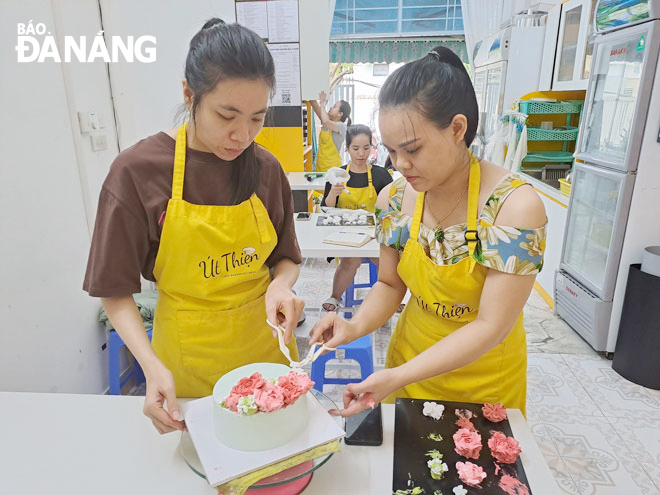Young people turn their passion for baking into a career
Pastries have evolved from being merely beloved treats to influencing current career trends. In the era of development and globalization, pastries come in diverse varieties, influencing the trajectory of the baking profession. Consequently, baking is no longer confined to the domestic kitchen but is emerging as a hot profession, especially after the COVID-19 pandemic.
 |
| Teacher Duong Nguyen Ngoc Thien (right) guiding trainees on how to decorate a cake. Photo: KHANH HOA |
Connecting through baking
Traveling hundreds of kilometers to Da Nang and overcoming the fear of moving to a new place, Ms. Huynh Thi Dang from Kien Giang Province sought out the Ut Thien bakery training centre located in Le Dinh Ly Street for her culinary apprenticeship after she coincidentally watched a tutorial on baking by Ut Thien on social media.
Commending Ms. Dang for her passion and strong determination to pursue baking, equal praise is due for the Ut Thien bakery facility, which has gained trainees’ trust and confidence, thereby attracting a large number of those from other parts of the country.
About her decision to move to Da Nang to learn baking, Ms. Dang shared that her family initially opposed the idea as nobody wanted her to endure a long journey, especially without any acquaintances, just to learn baking. Meanwhile, she could easily take a baking course in Ho Chi Minh City with similar costs after just a few hours of traveling.
While diligently decorating a bake with flower petals, Ms. Dang expressed, "Previously, I had worked as a factory worker near my home. Since the outbreak of COVID-19 began in Viet Nam, the company has yet to recover from the pandemic. Due to a lack of new orders, over 50% of the company’s workers, including me, have been laid off. Being unemployed and confined at home with household chores, I felt bored, so I decided to learn baking to start a business. Initially, I tried buying ingredients and learning from YouTube, but it didn't work out, so I was determined to attend a professional vocational training course. Among many baking tutorial videos, I found Ms. Ut Thien's page. Seeing her enthusiastic and reliable teaching, I decided to go to Da Nang to attend her class."
After attending three class sessions, Ms. Dang learned how to use and distinguish specialized baking tools, as well as identify ingredients for different types of Asian, European, and traditional Vietnamese cakes. The most important part of baking is to practice the hands as it needs to be flexible and skilled so that any decoration can be precise and delicate.
Ms. Dang proudly shared that she could master the basics of European-style cakes and several traditional pastries such as banana cake, dumplings, agar-agar, bread, and more. As a "special" trainee, she received direct guidance from the teacher daily, shortening the learning time to only 10 sessions, compared to the course's required 15 sessions, while ensuring that she can confidently make various types of cakes and open a business.
Forging a connection with baking from a family-serving perspective, Ms. Ngoc Anh, a resident of Thanh Khe Dong Ward, Thanh Khe District, Da Nang, believes that baking seems simple but is challenging; one must genuinely love it to have the patience because almost every step is done manually, consuming time and effort. Each type of cake has its own formula and secrets that need to be memorized. At first glance, making cakes like sponge cakes, bread, pineapple cakes, and cookies seems simple because they usually involve common ingredients such as rice flour, wheat flour, eggs, milk, and sugar, with a slight variation.
However, for a successful batch, the baker must carefully measure each ingredient, as a slight error can lead to failure. Experienced bakers can sometimes tell whether the dough is ready to be poured into the mold or if the cake needs extra time to rise or steam properly.
For example, when preparing the dough for sponge cakes, once the flour and eggs are beaten, they must be poured into the mold immediately. On the other hand, dough for bean cakes requires about 2 hours of fermentation before starting to shape and bake the cakes.
Ms. Ngoc Anh shared her experience, saying, "To make a delicious cake, like a sponge cake, you have to manually beat the dough for many hours, pour it into a copper mold, and then put it in the oven."
Ms. Duong Nguyen Ngoc Thien, the owner of the Ut Thien bakery training centre, mentioned that hundreds of trainees have attended training courses at her school, and successfully opened a business after completing their bakery training. Her trainees come from all age groups, backgrounds, and living conditions, but they all have a genuine passion for banking. Recently, the school has trained and supported a visually impaired person from Quang Ngai Province to open a bakery in her hometown.
Ms. Thien added that in the future, her school will connect and open a baking class for people with disabilities with the desire to help them make money from baking. Understanding the financial concerns of these people, the school not only focuses on providing them with baking knowledge and skills but also offering free accommodation and useful advice for them to open a bakery within their financial capacity.
In the long run, Ms. Ngoc Thien aims to upgrade her school into a baking academy in a bid to provide training in a more professional and comprehensive manner.
A popular choice for many people
Due to the increased layoffs amid a dramatic downturn in business because of COVID-19, a notable trend is emerging as the unemployed seek a new career path.
Vocational training centers and junior colleges in Da Nang reveal that many individuals are turning to baking as a viable solution to either embark on a fresh career or make extra money from baking.
After working in a garment company located in Hoa Khanh Industrial Park, in Lien Chieu District for nearly 5 years, Ms. Nguyen Thi Diem, a resident of Phong Dien Commune, Hue City, who left her job as a garment worker at this company. She then took a 30-session bakery course with a tuition fee of nearly VND 5 million
"I chose this job because it suits my health condition, the cost of learning and opening a bakery is not too high with only about dozens of millions of dongs, and the learning time is not long. After completing bakery course, I will open a bakery in my hometown in order to allow me to have enough time to care for my children while making extra money from baking to support my family," said Ms. Diem.
In the face of global economic challenges due to the COVID-19 pandemic, earning a monthly salary alone is not enough for many people to survive, so quite a few choose bakery as a side job.
Ms. Le Thi Kim Oanh, an employee of the Fujukura Automotive Viet Nam Company located in the Hoa Cam Industrial Park in Cam Le District, vividly illustrates this trend. After attending a baking course with 30 class sessions at a training center located in Phan Dang Luu Street, Hai Chau District, Ms. Kim Oanh has successfully opened a bakery.
Expressing joy over the initial success of going into a new career path, Ms. Oanh revealed that her bakery opens daily at 6:00 a.m.
However, earlier around 5:00 a.m. every day, the first batches of cakes of the day are already out of the oven, warm and fragrant. Each cake goes through many stages, with each step carefully taken, from selecting raw materials to designing patterns and themes.
Ms. Kim Oanh's delectable cakes have helped her garner a loyal customer base despite being a newly opened bakery.
While there are various types of cakes, they all share a common social characteristic: being closely connected to people's lives. Some buy cakes as gifts, while others eat them with their family. Some see them as a favorite daily snack. Along with the strong development of the tourism and food service industries, many famous bakery brands have entered the country.
Currently, large restaurants and hotels also include dessert menus to meet customer demands. Besides the types of cakes originating from Asian and European countries, traditional Vietnamese cakes such as bread, banana cakes, and xu xue cakes still hold a special place in the hearts of consumers.
Several vocational training schools in the city, such as the Asia-Europe Academy, the College of Tourism, and the Vietnam-Korea University of Information and Communication Technology, said that many well-structured and professional classes are opened annually. This demonstrates that amid globalization and social development in Viet Nam with countless novelties, the bakery job still holds a distinct place and is a practical need in people's lives.
Reported by KHANH HOA - Translated by THAO TRANG








